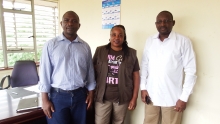“You are still very important to PSI.” Affiliates in Zimbabwe Receive Reassurance on PSI support.

The Regional Secretary for Africa and Arab Countries, Sani Baba Mohammed, gave these assurances during a PSI mission to the country where he and the team visited PSI’s 6 affiliates in Zimbabwe.
The meetings were to hold bilateral engagements with the affiliates in the country concerning their work as well as take stock of issues to be redressed, pertaining to the unions in the country.
These affiliates are the Civil Service Employees Association (CSEA) of Zimbabwe, Public Service Association (PSA), the Professional and Technical Officers Union (PROTEC) of Zimbabwe, the Zimbabwe Nurses Association (ZINA), the Zimbabwe Rural District Councils Workers’ Union (ZRDCWU), and the Zimbabwe Urban Councils Workers Union (ZUCWU).
As part of the meetings, the mission aimed at strengthening relations at bilateral and at the National Coordinating Committee (NCC) levels among the affiliates in the country. The objectives of the mission can be summed up as follows:
- To cement relations between the PSI leadership with affiliates, individually and collectively, by way of open engagement on key issues where cooperation is vital.
- To help create an environment that promotes stronger relations and collaboration among its affiliates in Zimbabwe.
- To ensure that affiliates begin to appreciate the importance of having to seek collective responses/actions on matters of common interests.
- To assure affiliates of the continued support from PSI Office on matters of importance to them.
Also discussed were issues surrounding privatization, public sector restructuring and how the regime change in Zimbabwe is impacting on the work of labour unions in the country.
Regional Secretary Sani Baba, expressing his delight on the overall success of the mission, was also glad that a good number of the people at the helm of the various unions that he had met were women. He therefore encouraged them to keep working hard for the progress of workers in their country.
“I also took this initiative because I realized that we have not paid much attention to the Southern African countries and so there has been an uneven gap between them and other parts of the region. This is why there is the need to interact with you all to be able to also afford you opportunities during PSI activities. Our intention is to make you participate actively in the work of PSI.”
He also stressed the need to be constantly in touch with the affiliates because “the end of projects in countries does not mean the end of PSI’s affiliations in those countries hence the need to still support you in other spheres of your work.”
Commenting on the initiative to meet with affiliates in Zimbabwe, General Secretary for the CSEA, Emelda Rungano Mhuriro was glad that these meetings were happening especially now.
“This is a very good step you have taken because you will get to meet each and every affiliate and listen to their concerns because people have many issues and besides, they don’t seem to be taking PSI businesses seriously any longer and are just keeping to themselves. This is the time we need solidarity the most too.”
At PROTEC and ZINA, the organizations extended their gratitude to PSI for coming in to help them financially when the country was going through economic challenges recently.
Overall, the various issues raised were narrowed down to the following:
- PSI needs to get a clear understanding of the socio-economic and labour context of the country, especially in the face of the political changes that took place last year.
- A revamp of the NCC in Zimbabwe because it has been very dormant in the last few years, contributing to
- A set of proposals largely provided by affiliates on how to confront all the issues facing the trade union movement in Zimbabwe.
- Commitment from leaders of affiliates to make efforts to jointly collaborate on issues that require collective action.
- Indication of appreciation of unity by leaders; in such a way that they explicitly mention that despite their current challenges, they shall work towards building and cementing unity between themselves going forward.
- Mapping of a clear-way-forward that will define what each of the identified players are to do in its execution.

